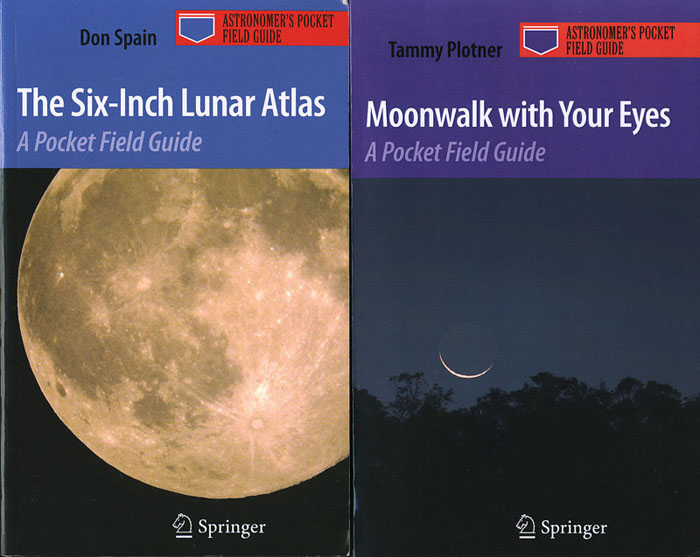Difference between revisions of "March 21, 2011"
| Line 5: | Line 5: | ||
<!-- ws:start:WikiTextLocalImageRule:6:<img src="/file/view/LPOD-Mar21-11.jpg/212234370/LPOD-Mar21-11.jpg" alt="" title="" /> -->[[File:LPOD-Mar21-11.jpg|LPOD-Mar21-11.jpg]]<!-- ws:end:WikiTextLocalImageRule:6 --><br /> | <!-- ws:start:WikiTextLocalImageRule:6:<img src="/file/view/LPOD-Mar21-11.jpg/212234370/LPOD-Mar21-11.jpg" alt="" title="" /> -->[[File:LPOD-Mar21-11.jpg|LPOD-Mar21-11.jpg]]<!-- ws:end:WikiTextLocalImageRule:6 --><br /> | ||
<br /> | <br /> | ||
| − | Here are two recent books for beginning lunar observers. Each is written by an enthusiast | + | Here are two recent books for beginning lunar observers. Each is written by an enthusiast |
| − | to share their knowledge with others. Tammy Plotner's <em>Moonwalk</em> book has a chatty and | + | to share their knowledge with others. Tammy Plotner's <em>Moonwalk</em> book has a chatty and |
| − | peppy approach, constantly offering encouragement. The book includes dozens of images | + | peppy approach, constantly offering encouragement. The book includes dozens of images |
| − | from Damian Peach, Peter Lloyd, Wes Higgins, Dierdre Kelleghan and others familiar to | + | from Damian Peach, Peter Lloyd, Wes Higgins, Dierdre Kelleghan and others familiar to |
| − | LPOD readers. One of the most valuable parts of the book is the acknowledgement section, | + | LPOD readers. One of the most valuable parts of the book is the acknowledgement section, |
| − | which includes a paragraph about various contributors - finally, we learn about the lives of | + | which includes a paragraph about various contributors - finally, we learn about the lives of |
| − | people who take such wonderful images; but it is a little peculiar that the author includes | + | people who take such wonderful images; but it is a little peculiar that the author includes |
| − | herself in this section! Although the author is an experienced writer she talks too often of | + | herself in this section! Although the author is an experienced writer she talks too often of |
| − | craters <em>spanning</em> so many kilometers (i.e. that is their diameter), and <em>powering up</em> (increasing | + | craters <em>spanning</em> so many kilometers (i.e. that is their diameter), and <em>powering up</em> (increasing |
| − | magnification). Don Spain's <em>Six-Inch Lunar Atlas</em> was a labor of love. His audience is the | + | magnification). Don Spain's <em>Six-Inch Lunar Atlas</em> was a labor of love. His audience is the |
| − | person manning the telescope at a star party who needs to show the public interesting | + | person manning the telescope at a star party who needs to show the public interesting features. He divides the Moon into 60 regions with three photos of each. The photos are of low |
| − | + | quality and most have been processed to add contour-like lines. Although in some cases | |
| − | quality and most have been processed to add contour-like lines. Although in some cases | + | this appears painterly, mostly it makes the images less useful. The descriptions in both of |
| − | this appears painterly, mostly it makes the images less useful. The descriptions in both of | + | these books include few interpretations of the features seen, and both include some errors |
| − | these books include few interpretations of the features seen, and both include some errors | + | of understanding, but their enthusiasm is infectious. |
| − | of understanding, but their enthusiasm is infectious. <br /> | + | <br /> |
<br /> | <br /> | ||
<em>[mailto:tychocrater@yahoo.com Chuck Wood]</em><br /> | <em>[mailto:tychocrater@yahoo.com Chuck Wood]</em><br /> | ||
| Line 27: | Line 27: | ||
A favorite intro level book is <em>[http://www.lpod.org/archive/archive/2004/06/LPOD-2004-06-20.htm Discover the Moon]</em> by Lecroux and Legrand.<br /> | A favorite intro level book is <em>[http://www.lpod.org/archive/archive/2004/06/LPOD-2004-06-20.htm Discover the Moon]</em> by Lecroux and Legrand.<br /> | ||
<br /> | <br /> | ||
| + | <hr /> | ||
<p><b>Yesterday's LPOD:</b> [[March 20, 2011|Nautical Supermoon]] </p> | <p><b>Yesterday's LPOD:</b> [[March 20, 2011|Nautical Supermoon]] </p> | ||
<p><b>Tomorrow's LPOD:</b> [[March 22, 2011|Red Moon Rising]] </p> | <p><b>Tomorrow's LPOD:</b> [[March 22, 2011|Red Moon Rising]] </p> | ||
| − | < | + | <!-- End of content --> |
{{wiki/ArticleFooter}} | {{wiki/ArticleFooter}} | ||
Revision as of 17:12, 1 March 2015
Two New Books

Here are two recent books for beginning lunar observers. Each is written by an enthusiast
to share their knowledge with others. Tammy Plotner's Moonwalk book has a chatty and
peppy approach, constantly offering encouragement. The book includes dozens of images
from Damian Peach, Peter Lloyd, Wes Higgins, Dierdre Kelleghan and others familiar to
LPOD readers. One of the most valuable parts of the book is the acknowledgement section,
which includes a paragraph about various contributors - finally, we learn about the lives of
people who take such wonderful images; but it is a little peculiar that the author includes
herself in this section! Although the author is an experienced writer she talks too often of
craters spanning so many kilometers (i.e. that is their diameter), and powering up (increasing
magnification). Don Spain's Six-Inch Lunar Atlas was a labor of love. His audience is the
person manning the telescope at a star party who needs to show the public interesting features. He divides the Moon into 60 regions with three photos of each. The photos are of low
quality and most have been processed to add contour-like lines. Although in some cases
this appears painterly, mostly it makes the images less useful. The descriptions in both of
these books include few interpretations of the features seen, and both include some errors
of understanding, but their enthusiasm is infectious.
Chuck Wood
Technical Details
A favorite intro level book is Discover the Moon by Lecroux and Legrand.
Yesterday's LPOD: Nautical Supermoon
Tomorrow's LPOD: Red Moon Rising
COMMENTS?
Register, Log in, and join in the comments.



